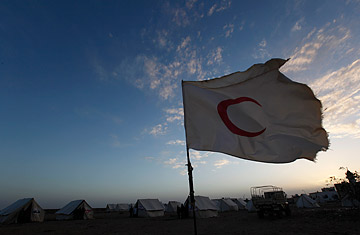
Egyptian army soldiers set up a field hospital at the Egyptian-Libyan border in Salloum.
On Tuesday, the Libyan-Egyptian border was throbbing with traffic. One Egyptian soldier said it was the busiest day he's seen yet; but it had been consistently busy — with thousands crossing — for the past few days. The traffic consists mostly of Egyptian workers, many of whom express outrage over the atrocities of Libya's Muammar Gaddafi that they witnessed as they fled. "This man is a war criminal!" cries one Egyptian who had just crossed back into his country. "They were firing on people from planes."
"We left at 5 a.m. this morning, we saw a lot of gunfire; a lot of killing," says another returnee, a construction worker who had arrived in a packed car full of his fellow countrymen from Tobruk, the Libyan city about 100 miles from the border. They had come from all parts of Libyan but car-pooled the final leg back home. "I saw them firing in Benghazi [Libya's second-largest city about 500 miles west of the border]. People were approaching the army with their arms up like this, raised in surrender," says another man, his hands up to show what he means. "They sprayed people with gunfire," he says, eyes wide, practically screaming. "The killing is outrageous. For five days, the doctors at al-Gelaa hospital in Benghazi have not slept."
Egyptian medics have been at the forefront of coming to the aid of their neighbors. One of the organizing groups is the Egyptian Doctors' Syndicate is one of several running convoys into Libya. One 13-person group about to head in was made up mostly Egyptian paramedics and doctors, accompanied by a volunteer entourage of armed Libyans for protection. On Tuesday, they planned to make it to Benghazi the same night from Salloum on the border. Most of them had volunteered in the makeshift clinics of Tahrir Square, the epicenter of Egypt's own revolution, which culminated on Feb. 11 with the resignation of President Hosni Mubarak. Says Mustafa Marwan, a pharmacist and a member of the convoy: "Most of the people here are from the field hospital in Tahrir Square. So it is interesting, like spreading the revolution."
At the same time, Egyptians are evacuating Libya as quickly as they can. There were an estimated 2 million Egyptians working in Libya when the uprising against Muammar Gaddafi broke out. Many fled because they felt threatened. "After Gaddafi said that some Egyptian and Tunisian people were working with the revolution and giving us money, the Egyptian and Tunisian people got scared so they are leaving," says Gamal Shallouf, a member of newly fledged opposition to Gaddafi in Tobruk.
On the Egyptian side of the border, the bus operators who have flooded the area shout out their destinations ("Alexandria!" "Cairo!") to groups of young men hurrying out of the gates with suitcases balanced on their shoulders. Everyone has something to say to the first groups of foreign journalists who have arrived at Salloum, the Egyptian town at the border. Most of it is outrage over Qaddafi's brutality. But there are others exiting the border with sighs of relief A truck full of Asian workers and all of their belongings pushes through the crowd without stopping. The men in the truck shout that they are engineers, but it's not clear what nationality.
Despite the flight of the Egyptians back into their own country, there is a sense of solidarity. The Egyptians, returning to a homeland just emerging from its own revolution, clearly feel for the Libyans who are in the middle of their own fight. "The Libyans and the Egyptians are one," says an Egyptian worker named Reda, standing with people from both countries. "We protect each other."
"All of us have Egyptian friends," says Shallouf in Tobruk. "And many of my friends were in Qa'id Ibrahim Square in Alexandria protesting. I was talking with them daily. They told us that we can do it" He adds: "The Egyptians are supporting us by phoning and by feeling, like how we supported them. I know today and yesterday, some Egyptians went to the Libyan embassies to support us there. I heard on the phone and Al Jazeera. Some friends called me and told me."
Marwan the pharmacist says that he and his fellow volunteers had only really communicated with their Libyan counterparts on matters of aid supplies (they were ferrying two truckloads of medicine, and one truck of blankets). They had not discussed politics. But it really went without saying. "Well, politics," he says, "Everyone agrees that what is happening is horrible. Gaddafi struck them with planes. He's a total lunatic." But he considers what is happening and links it up with what has happened in Egypt and what he and his friends are doing to connect the dots. "Maybe this revolution is more violent than ours," says Marwan, "but the ripple effect has been very fast. It's time for the Arab world to turn, and I think when we finish Libya, we will go to Saudi Arabia!"
